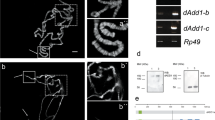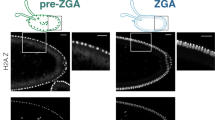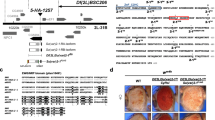Abstract.
The Drosophila gene dMBD2/3 encodes a protein with significant homologies to the mammalian methyl-DNA binding proteins MBD2 and MBD3. These proteins are essential components of chromatin complexes involved in epigenetic gene regulation. Because the available in vitro data on dMBD2/3 are conflicting we have started an in vivo characterization of dMBD2/3. We detected expression of two isoforms specifically during embryonic development. Staining of whole embryos combined with high-resolution confocal microscopy revealed a highly regulated spatial distribution. During the syncytial blastoderm stage, dMBD2/3 formed speckles that localized to the cytoplasm. Shortly after, during the cellular blastoderm stage, the protein entered the nucleus and formed bright foci that associated with DNA. This rapid transition coincided with the activation of the embryonic genome. A similar observation was made during activation of the spermatocyte genome as dMBD2/3 formed distinct foci associated with the activated Y chromosome. Our results indicate that dMBD2/3 forms specialized nuclear compartments to keep certain genes epigenetically silenced during genome activation.
Similar content being viewed by others
Author information
Authors and Affiliations
Additional information
Electronic Publication
Rights and permissions
About this article
Cite this article
Marhold, J., Zbylut, M., Lankenau, DH. et al. Stage-specific chromosomal association of Drosophila dMBD2/3 during genome activation. Chromosoma 111, 13–21 (2002). https://doi.org/10.1007/s00412-002-0188-2
Received:
Revised:
Accepted:
Issue Date:
DOI: https://doi.org/10.1007/s00412-002-0188-2




